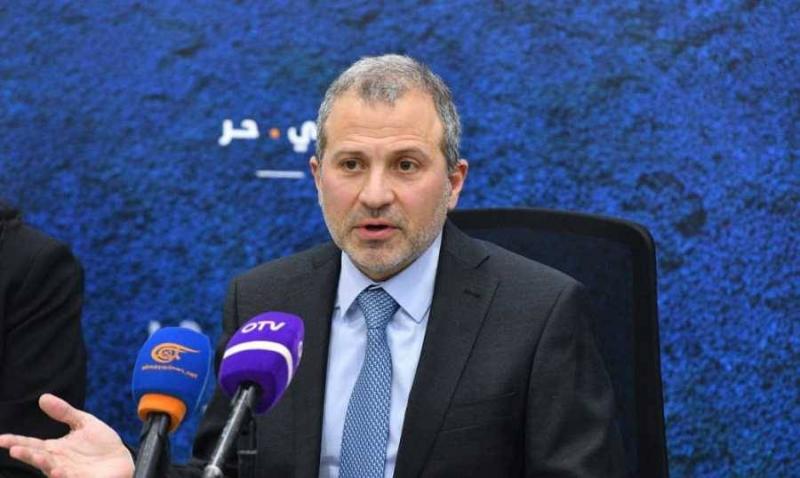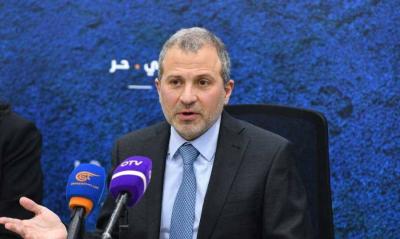Former President Michel Aoun openly rejected all justifications by Hezbollah's Secretary-General Hassan Nasrallah regarding opening a southern front when he announced that we are not bound by a defense treaty with Gaza and that the deterrent against any aggression does not rest with a militia that undermines the state's role, but rather it is the responsibility of legitimate institutions operating according to the constitution and laws. This position completes the arc of the crisis created by Deputy Gebran Bassil with the party and opens the door for discussions about the seriousness of burying the Mar Mikhael Agreement and the extent of the discord between the two parties. Is there a possibility to change the political map in light of this variable? Can Bassil free himself from his commitments and interests with the party? Should the opposition absorb the Free Patriotic Movement at this stage and avoid repeating what happened prior to Aoun's return to the country? According to "Nidaa al-Watan".
Two viewpoints divide opinions regarding the current status of the movement:
- **First View**: This perspective sees what is happening as a maneuver by Aoun and Bassil to regain what they lost in the Christian street during the Mar Mikhael Agreement, especially during Aoun's presidency. It posits that Hezbollah coordinated with Bassil on this maneuver to restore balance to the Aounist-Bassilian situation because it wants a strong Christian partner. Since it is not election time, there is room for differences and a wide margin for action, with the possibility that Bassil might use the game of extortion between the opposition and Hezbollah to strengthen his position in the political equation. There is a theory that suggests Bassil is unable to free himself from his commitments and benefits, a valid assertion that is also linked to what the party can actually provide him, especially with signs of weakness emerging from the party due to the ongoing military and political conditions. Signs of divergence and differentiation within the ranks of the party's allies are already evident, with the model of Wiam Wahhab available to consider. The party’s allies may bet on its strength, but when it weakens, they will seek their own interests, although some argue that Hezbollah does not change its alliances and remains steadfast. These individuals believe that Bassil is still under the party's guardianship, as evidenced by the absolute support that its leadership provided to the Free Patriotic Movement’s candidate in the upcoming Engineers Syndicate elections.
- **Second View**: Proposed by some politically involved individuals, this view calls for the necessity of incorporating the Free Patriotic Movement into its current transformations, recalling its history and discourse in confronting the Syrian regime and Hezbollah before returning. They argue that the current political moment is suitable for continuing to strip the Christian cover from the party and creating a change in existing equations to achieve a balance that allows for a resurgence of the state's project. They note that the party cannot, for ground and political reasons, turn its weaponry inward as happened on May 7, 2008. Therefore, there is potential to build on national and political commonalities within the movement, as was the case in the presidential intersection around the name of former minister Jihad Azour. Advocates of this opinion emphasize that the participation of Deputy Nada Boustany in the delegation/initiative organized by Deputy Fouad Makhzoumi and her acceptance, along with the leadership of the movement, of the high political ceiling that prevailed in the discourse of the Lebanese parliamentary delegation in London serves as an important indicator of the seriousness of this trajectory taken by the movement, further strengthened by Aoun’s stance on the developments in the south. Additionally, Bassil attempted to reach out to Prime Minister Najib Mikati for a meeting and to Deputy Ashraf Rifi for a visit before the canceled trip to Tripoli; however, it was a failed attempt as he adopted an approach of ignoring the significant issues with both men and did not prepare for that step with any statements reflecting a change in his positions and behavior towards Tripoli, Mikati, and Rifi, suggesting that had he made this change, the situation could have been different.
Supporters of the call to contain the Free Patriotic Movement believe that politics is a matter of variables that impose themselves on parties and political forces. The internal discontent in the movement regarding the alliance with Hezbollah has lasted for no less than two years, which the party is aware of. This has surfaced more than once in the statements made by its Secretary-General, directly addressing the movement's leadership and audience at sensitive contentious points, and was reinforced recently by former Minister Pierre Raffoul, who announced his official divorce from the party.
### Four Additional Factors
Observers note four additional factors in assessing the situation:
1. No matter how much Bassil is downplayed, if he were to re-establish an agreement with Hezbollah now, it would create a crisis in the current fragile political balances, especially since he has a significant and influential parliamentary bloc.
2. The exceptional character of Michel Aoun has ended (politically), and with it, the individual who could lead Christians towards opting for Hezbollah, as happened at the moment the understanding document was signed with the party, given that after the presidential experience, which the deputies of the orange movement accuse the Shiite duo of sabotaging, the man has exited the political scene and is no longer capable of influencing either the broad Christian audience or decision-making, especially with the deep progress made by the Lebanese Forces in the Christian street while maintaining a balanced national discourse. Bassil realizes he cannot continue his alliance with the party for all these reasons.
3. Hezbollah is facing many weakening factors, especially under the current military strain in the south and its inability to impose its decisions by force. This has been accentuated following the Saudi-Iranian reconciliation and the transformations sweeping the region amid the Israeli aggression on Gaza.
4. The uncovering of the realities regarding the changes Hezbollah is reportedly seeking in the structure of the state, primarily the abolition of the army command and its replacement with a general staff practically controlled by it, and legalizing its presence by establishing a missile unit within the army managed by the party and deployed along the borders. Will the Free Patriotic Movement accept the removal of the army command after experiencing normalization in the governance of the Central Bank by removing Christians from its presidency? Can the movement adapt to a project that exceeds the notion of parity regardless of the temptations to continue politically covering it?
Michel Aoun has long been a controversial figure, and Bassil has become even more so, according to "Nidaa al-Watan." However, there is a middle ground necessitated by political necessities, which is to continue intersecting on common grounds. Nonetheless, the openness shown by Deputy Fouad Makhzoumi through the participation of Deputy Boustany and expressed by Deputy Ihab Matar can lead to deeper discussions that draw on the experiences of the Mar Mikhael Agreement, former Prime Minister Saad Hariri's presidential deal, and the Maarab Agreement to adopt a realistic vision that would establish a new understanding with Hezbollah based on everyone's right to exist within the state and the state's right to existence and action.




